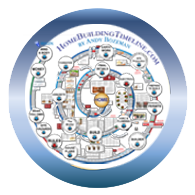The partial or entire destruction of a home, by any disaster, has catastrophic effects on personal well-being, family health, financial security, and one’s whole sense of existence. The instinct to survive is an irresistible force. The process of restoring the home can seem like an immovable object. This is a time to remain calm, to make decisions without emotion, to proceed with eyes wide open.
Several aspects of personal disaster recovery are not obvious. They follow.
The Spending Urge – Resist It !
A big check from your insurance company may be cashed and resting quietly in your bank account. It’s not there to be spent for anything that might be a salve to console you and your family because you’ve been through a disaster. Its sole purpose is to build back your home. Make sure it does ONLY that.
Because any given disaster victim is often just one among thousands, the wait-time for re-building may be long. Without a doubt, waiting is a form of suffering. Suffering longs for relief. Spending insurance money for clothes, trips, cars, smartphones, dining out, …just stuff offers a brief escape from the reality of not being home. However, as waiting equals suffering, brief equals temporary, and temporary equals wasted. That money is for the permanence and security of the one place you and those in your care will be safe, warm, and dry: home.
Retirement Infusion Improves House but Wrecks Financial Future
“While we’re at it, let’s make it better. We can borrow from our retirement account.” That’s an often used expression connected with building back after a disaster. Upgrading a home’s features is not a bad idea. Using retirement money to do it is a terrible idea. Money, saved for retirement, deserves protection from all assailants, even its owner.
The e-book GHOST BUBBLE by Andy Bozeman offers in-depth information about the crisis created when retirement accounts are tapped for the wrong reasons.
Like Wolves to Prey
By the way, you’re the prey. After a serious disaster displaces an entire family for an unknown period of time, the fretting begins. Questions will arise, like: When will the insurance money come? When will the builder start? When will the house be ready? When can we go home?; and all of these occur while the uncertainty of the desperation of not knowing overwhelms every family member with exhaustion and fear, two things every ‘wolf’ can sense.
So, who are the wolves? Scammers – lesser humans who can’t make it as builders/contractors in their own home town because they’re known as crooks. Now they’ve relocated to find fresh opportunities and fresh ‘meat’ – you.
It’s not hard to tell the difference between a builder of integrity, and a beast. First, ask for documentation.
REAL contractors will have the correct documentation, all of which can be verified with a few phone calls:
- A state sanctioned contractor’s license.
- Documents of being Bonded and Insured.
- A business license.
- A call-list for references by past, happy customers.
Avoiding Scams
Fake builders are harder to spot, but can’t hide from caution. Be extremely cautious if there’s a lack of paperwork. It’s not always a scam, but city, county, and state business-licensing laws must be followed in order to perform any services, anywhere. Stay alert and vigilant to protect yourself from unscrupulous operators who will offer assistance for removing debris or repairing damage. They are looking for ways to take your insurance money.
Tips to Avoid Scams:
- Door-to-door solicitation is also a strategy used by burglars to check and see if a resident is home, before committing a burglary.
- Anyone who solicits, door-to-door, must have a city/county-issued business license.
- To check the validity of a business license, call the local city/county Finance Department, during regular business hours.
- Except for the homeowner, no one can legally make repairs for other homeowners, without a license from the city/county, and be bonded and insured. It is recommended that you refuse to work with anyone who cannot prove they have these credentials.
- Don’t pay in-full for work up front. Repair services that request full payment up front before completing the work should be viewed with scrutiny. If they fail to make the repairs or do shoddy work, you’ll have the leverage of holding some of their money until they complete the job to the agreed level of quality.
- If you feel you’ve been victimized by a scam, please call the police department during regular business hours and make a report. Law Enforcement takes scams very seriously and will not tolerate fake builders.
NO BURNING
So many times, structures survive a disaster, only to be burned to the ground, during the cleanup process. Do not burn refuse inside the city limits. Even in rural areas, be very careful to check for gas leaks, and the proximity to potential fire of any easily combustible debris. Instead, place refuse in a pile along the roadside for pick-up by a waste management service. Be careful not to block traffic.
Prevent Injuries during Cleanup
Don’t put yourself or family at risk, by trying to move things which are too heavy or unwieldy. Almost as many injuries happen to people trying to clean up afterwards as during a disaster. Emergency rescue crews and vehicles may not be available to rescue you from a clean-up injury because they’re busy in other places with other injured people. If you are going to do work yourself, here are a few tips on how to avoid injuries:
- If power lines are caught in trees or debris, STOP and do not attempt cleanup. Power and tree crews are working as fast as they can, but you can’t know for a certainty that the lines aren’t still live. Do not touch or attempt to move downed power lines, or any debris in contact with them.
- When using power tools, especially chain saws, experience is best, but at least read the instructions for the tool, and wear appropriate personal protective equipment, including ear and eye protection. When trimming branches overhead be sure and wear head protection, as well.
- When lifting, prevent back injury by lifting with your legs instead of just your back muscles. Muscle strains can be extremely painful, even debilitating. A clean-up injury is one more thing to worry about. Be careful.
- Don’t expect too much from the family. Spouse and children are the reason to be safe, not the means to make it safe. Resist the impulse to ask them to do more than they safely can. Heavy lifting of unstable debris, whether from a tree or a house, can cause serious, permanent injury. Wait, patiently, for strong, professional helpers to come along.
Protect Your Family

Buy a subscription
just for yourself.

Give a subscription
to someone
who might need help
building or remodeling.

Tell someone
who needs to see HBT.